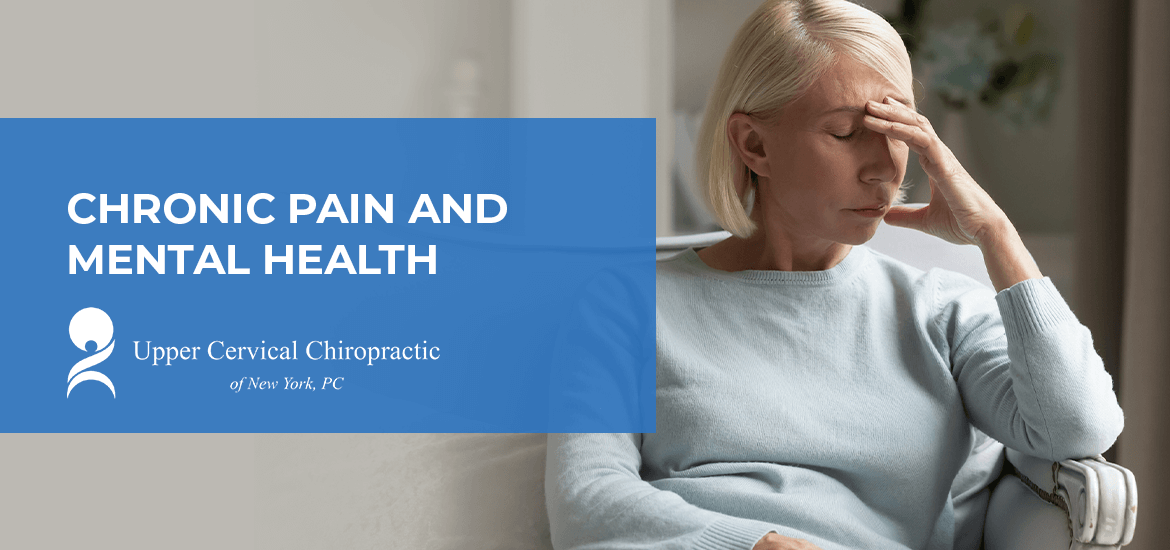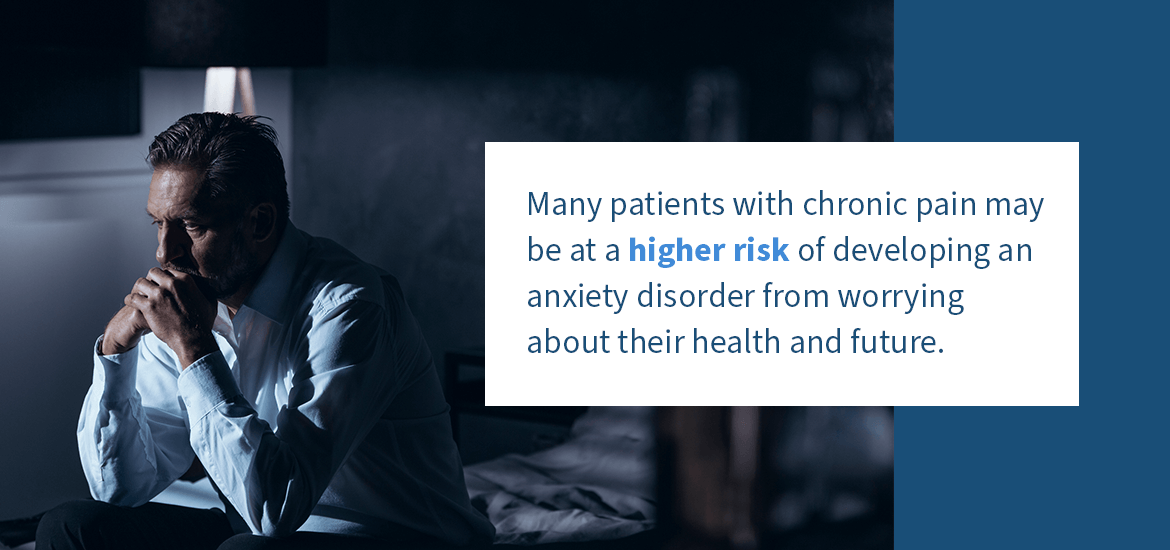Throughout life, it is normal to experience discomfort or some level of pain. Many of us will also experience acute pain, which is often caused by a specific incident. Acute pain is typically intense and does not last longer than six months. Additionally, acute pain usually goes away when the underlying cause of pain is treated and addressed.
Chronic pain is another form of pain many people may experience. Unfortunately, chronic pain is long-lasting and continues longer than six months. Additionally, chronic pain can be a lifelong condition for many. Chronic pain and mental health are closely related, directly influencing one another.
What Is Chronic Pain?
Chronic pain is a form of long-term pain that typically lasts longer than 12 weeks. Chronic pain is a common condition, affecting approximately 20.4% of adults, with 7.4% of adults with chronic pain that limits daily activities. In many cases, chronic pain develops after an initial injury, such as a pulled muscle, broken bone or sprain.
Chronic pain can develop slowly because of a degenerative disease, including degenerative disc disease or multiple sclerosis. When a nerve is damaged, it can cause intense, recurring and long-lasting pain. Without proper treatment, a damaged nerve will continue to cause discomfort, worsening over time or during certain activities.
What Are the Psychological Effects of Chronic Pain?
Chronic pain’s impact on mental health can create additional challenges. Some of the most common reasons people seek out medical care for chronic pain, aside from discomfort, include poor quality of life, limited activities and a dependency on opioids. Additionally, many people with chronic pain also seek medical attention for pain impacting mental health and causing depression, anxiety and other mental health conditions.
Those with chronic pain have three times the average risk of developing various psychiatric symptoms, typically anxiety disorders. Chronic pain and mental health statistics also show patients with depression have three times the risk of developing chronic pain. Unfortunately, chronic pain affects almost every aspect of a patient’s life. In many cases, a patient may be so concerned with addressing the physical side effects of chronic pain they may pay less attention to the psychological impact of chronic pain.
While many patients think of physical and mental symptoms as separate, they directly influence one another. Poor mental health can exacerbate a person’s perception of pain. In some cases, depression and anxiety can cause a cycle that worsens painful symptoms and negative emotions and begins the process again.
The Relationship Between Chronic Pain and Mental Health Disorders
The relationship between long-term pain and mental health is complex. Still, it is essential for those with chronic pain to understand the correlation between these conditions. Even though chronic pain and mental health issues affect many people, it is common to feel isolated when dealing with these conditions.
Chronic pain and mental health disorders are disruptive conditions that can negatively impact almost every aspect of a person’s professional and personal life. Although each person is different, many patients with chronic pain may develop various negative emotions, such as anxiety, depression, guilt and hopelessness.
Chronic Pain and Depression
Depression is one of the most common mental health concerns for patients who experience chronic pain. Depression can complicate other medical conditions and aggravate the source of chronic pain. Research has shown over 280 million people in the world have depression. While depression is quite common in those with chronic pain, many people do not receive a proper diagnosis, meaning their depression is never addressed or treated properly.
Since chronic pain causes such serious and noticeable symptoms, it is often the sole focus of physicians and patients. As depression goes undiagnosed, it can worsen and cause low energy, insomnia and appetite loss. Chronic pain and depression share the same neurotransmitters, which are brain chemicals that serve as messengers to travel between nerves. Chronic pain and depression have also been shown to share some of the same spinal cord and brain nerve pathways.
Chronic Pain and Anxiety
Chronic pain and medical conditions that result in long-term pain can cause and worsen anxiety because they can make you feel unsure about your future. Research has found approximately 31.1% of adults in the United States experience an anxiety disorder during their lifetime. Many patients with chronic pain may be at a higher risk of developing an anxiety disorder from worrying about their health and future, which can be an incredibly stressful sensation.
While coming to terms with chronic pain and a medical diagnosis can be a therapeutic step, many patients still struggle or experience anxiety about daily life with chronic pain. If chronic pain worsens, it can lead to debilitating pain and limited mobility, exacerbating a person’s anxiety level. It is normal for many people with chronic pain to feel overwhelmed by life, especially if they struggle with finances because of chronic pain.
How to Address Chronic Pain and Mental Health Disorders
Chronic pain and mental health disorders can be overwhelming. Fortunately, there are many options available for patients dealing with chronic pain, anxiety and depression. If you are dealing with chronic pain and mental health concerns, you may want to consider talking to your physician about:
- Chronic pain treatments: Fortunately, there are many medical treatments, such as spinal correction, that can improve chronic pain and discomfort. A doctor can assess your symptoms and suggest various treatments that may alleviate pain. In most cases, physicians recommend nonsurgical or minimally invasive treatments to improve symptoms of chronic pain. In more severe cases of chronic pain, a physician may suggest surgical treatment.
- Talk therapy: Psychotherapy, commonly known as talk therapy, can be an effective way to lessen anxiety, depression and chronic pain. Psychotherapy is an effective part of treatment to alleviate chronic pain because therapy can change how your brain processes pain. Additionally, talk therapy allows patients to discuss difficult and negative emotions related to chronic pain, allowing them to address these feelings and learn effective coping mechanisms.
- Medications: There are effective medications for the physical complications of chronic pain and the emotional aspects of mental health disorders. Antidepressants can help stabilize a person’s mood and improve negative symptoms of depression and anxiety. Additionally, effective pain medications can reduce the physical complications and side effects of chronic pain.
Get Help From Upper Cervical Chiropractic of NY
At the Upper Cervical Chiropractic of New York, PC, we dedicate ourselves to helping restore the health of our patients. Our team promises to provide all patients with the most effective and safe spinal correction procedures. We strive to promote wellness and improve the quality of life for our patients while providing a compassionate atmosphere.
We treat a variety of conditions, including scoliosis, herniated discs, neck pain and back pain. To learn more about our treatments, contact us online today or call (914) 686-6200.
REVIEWED BY DR. GEORGE GERTNER

Dr. George Gertner is a family man, healer, philanthropist, author of “The Gift of Hope”, public speaker, and founder of one of the world’s busiest Upper Cervical Chiropractic clinics.
After receiving his bachelors degree in biology from Hofstra University in Hempstead, NY Dr. Gertner moved to Atlanta, GA to attend Life University. Before graduation, Dr. Gertner had a severe injury to his lower back. Traditional chiropractic procedures were not providing relief until he met a chiropractor that specialized in NUCCA (National Upper Cervical Chiropractic Association.)
Then he spent the next two years mentoring from one of the best Upper Cervical doctors; learning in the same office that helped change his life. After two years, Dr. Gertner returned home to New York to open his own office. He currently is one of less than 300 NUCCA chiropractors worldwide.
Dr. Gertner has been featured numerous times in Chiropractic Monthly Magazine for his expertise in treating Trigeminal Neuralgia and Myofascial Pain. Dr. Gertner has lectured locally and nationwide discussing various symptoms using the Upper Cervical technique.




